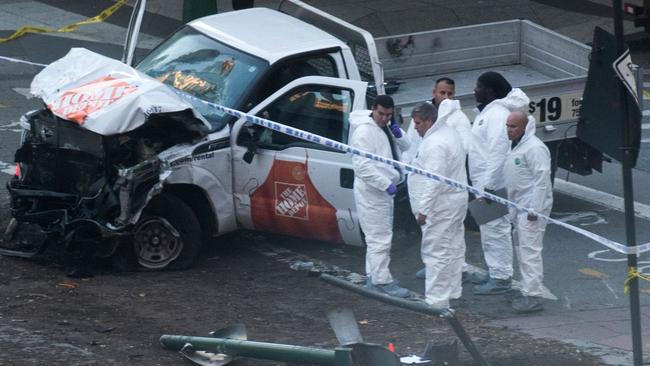New York attack: Central Asia badlands prove fertile ground for extremists
The attack in New York has accentuated the growing threat of jihadi-inspired terrorism from Central Asia.

The attack in New York has accentuated the growing threat of jihadi-inspired terrorism from Central Asia, the former Soviet region between Russia and China where little economic opportunity and less political freedom have combined to drive young men toward radicalism.
Officials identified the suspect, who allegedly drove a ute along a Manhattan bike path, killing at least eight people and injuring a dozen, as Sayfullo Saipov, 29, who moved to the US from Uzbekistan in 2010. He is in hospital after being shot in the abdomen by police.
Police found handwritten notes near his ute saying the suspect carried out the attack in the name of Islamic State.
The FBI did not immediately comment on whether the Uzbek national, who was a resident of Florida, was previously known to authorities. A photo of Saipov circulating on social media shows a dark-haired male sporting an Islamic-style Sunnah beard.
Uzbekistan has a history of Islamist militancy, centring primarily on the Islamic Movement of Uzbekistan, which has splintered since its founding in the late 1990s, with offshoots allying with the Taliban, al-Qa’ida and ISIS.
A 2015 report by the International Crisis Group warned that growing numbers of Central Asians — up to 4000 — were travelling to the Middle East to support or fight for Islamic State, “prompted in part by political marginalisation and bleak economic prospects that characterise their post-Soviet region”.
Uzbek nationals have been linked to a handful of terrorist cases in recent years, including incidents in Sweden and Russia. They also have been targeted in counter-terrorism operations in the US. In 2015 federal prosecutors in New York charged several Uzbeks living in Brooklyn for conspiring to join or aid Islamic State. The arrests were the result of an investigation that began after one of them posted to an Uzbek-language website that called for visitors to join the extremist group.
Uzbekistan is not among the countries targeted by the Trump administration’s immigration policy that focuses on citizens of nations deemed to pose a high risk to national security and welfare. None of the countries on the list belong to the Central Asian region.
There were no immediate claims of responsibility by any group for yesterday’s attack, and experts said it was too early to attribute the attack to Islamic State.
Other attacks linked to Central Asian militants this year have been in Sweden, Russia and Turkey.
A 39-year-old Uzbek national who drove a truck into a crowd in the Swedish capital of Stockholm in April was known to the police for failing to report for his deportation. The Uzbek government linked him to Islamic State. The same month, Russian authorities identified an ethnic Uzbek citizen of Russia, who was born in Kyrgyzstan, as the perpetrator of a bombing on the St Petersburg metro that killed at least 14 people. Authorities said he died in the attack.
Months earlier, Turkish authorities identified an Uzbek national as the gunman who opened fire on Istanbul’s Reina nightclub, killing at least 39 people.
Islamic State claimed responsibility for the attack.
Turkish authorities also said Central Asians from Uzbekistan and Kyrgyzstan were among the assailants in last year’s attack on Istanbul’s airport, which killed more than 40 people.
The Wall Street Journal



To join the conversation, please log in. Don't have an account? Register
Join the conversation, you are commenting as Logout